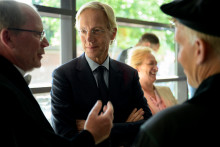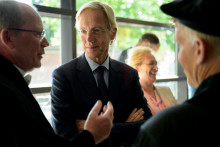Dark clouds are gathering over education, if we are to believe outgoing Minister Dijkgraaf. ‘Instead of being a social engine that elevates large groups in society, education is threatening to become an instrument that perpetuates and widens differences’, he writes to the House of Representatives today.
Higher education institution graduates live longer and healthier lives than everyone else, he explains to the House of Representatives. Their incomes are higher, they build more capital and are better represented in politics and administration. ‘They’re generally happier’, according to the minister. ‘These advantages are passed on to the next generation; the level of education of your parents partially determines which school you attend and in which environment you grow up.’
To counterbalance this, he has laid out some aims for his fellow politicians. Let MBO (secondary vocational education), HBO (higher professional education) and WO (university education) form a fan shape: types of education that are next to each other, without differences in ‘level’. He thinks it’s a good idea for universities of applied sciences to start offering more Master’s programmes and develop their own PhD programme (‘professional doctorate’). And why wouldn’t something like this be possible in MBO, he wonders.
He wants to start by changing the terms people use. ‘For instance, we can say HBO and WO instead of ‘higher education’ where possible, as well as HBO/WO graduates and MBO graduates rather than higher and lower educated. Moving up and down can be replaced by the neutral ‘transitioning’.’ He continues to encourage secondary school pupils to go into vocational education, if they want.
There’s something contradictory there. You list all the advantages of higher education and then say to those in secondary school: you can also go to MBO and miss out on all of those advantages.
‘There are many forces in society that widen the differences. It’s almost like gravity. If you do better, are healthier and have more money, that also means you can provide more to your children and enrich them in financial, cultural and other terms. I’m extremely worried about the differences in our society growing bigger, as we’re seeing all around the world.’
‘The fan is slanted: if you’re in MBO, you’re done quicker’
But should you then encourage children to go into MBO?
‘In the end we need all forms of education. You always have a natural diversity in society: not everyone wants to study at university. That’s why we have to create equality, meaning that students at all levels receive the same type of support and have the same type of opportunities, including for continued learning.’
And then they have to settle for a lower income?
‘There are sectors in vocational education where people earn excellent wages. They can become entrepreneurs, for example. But the question is: can they also continue to develop in this area? The fan for vocational education is rather slanted: if you’re in MBO, you’re done quicker. We have to even things out. Income isn’t the most important aspect anyway. In some professions you make more, in some you make less. It’s true that the average surgeon earns more than a philosophy graduate, but people still have very good reasons for wanting to study philosophy. It’s also not the case that your education has a one-on-one relationship with aspects such as health. But anything we can do to reduce differences is good.’
What’s the danger of politicians ignoring this issue?
‘If you widen differences through education, support for education itself will erode. People will then start saying: education actually only serves to improve the lives of the select few in society that were already doing well. Then the whole structure will come crashing down.’
Good education and equal opportunity for everyone sounds logical for a minister of education. But why would you like to see more young people go into vocational education?
‘There’s a practical reason for that as well. What does the country currently need? There’s a need for physics PhDs, but there’s definitely also a need for a large number of professionals in healthcare, technology, education... Those are vocational programmes and we have to do whatever it takes to make those programmes more appealing.’
But there’s apparently also a need for university graduates. They’re hardly ever unemployed.
‘We live in a world of labour shortages. At the moment, there isn’t much point to saying: let’s discontinue this degree programme, because we’re training our students for unemployment. ‘Negative’ steering won’t work. It’s better to look at things from a ‘positive’ perspective. Society is facing major challenges in healthcare, education, climate change... We can make great policies in these areas, but if we don’t have the people, it’s simply not going to happen.’
Do you think there are students who are in the wrong place?
‘I’m definitely not saying large groups of students are in the wrong place, but on the other hand we do see students in university education who are saying: I think it’s too stressful, I’m really only here because people told me I had to continue learning.’
‘Why shouldn’t a WO student learn how to create animations in MBO?’
Those aren’t large numbers though?
‘The universities themselves are saying it’s 10 to 15 percent, but there’s no way for me to verify this.’
That’s just a percentage they made up.
‘I really don’t know. Look, in education we celebrate diversity: you want pupils and students to be the best versions of themselves, across all professions. To this end, you sometimes have to make it a bit easier to switch from one type of education to another. Why can’t you combine things? Why can’t you be enrolled in a WO programme and take a few courses in HBO or MBO? Suppose you say: I want to learn how to make animations. Why shouldn’t this be possible? That would enable education to bring people closer together. At the moment, it is far too compartmentalised.’
‘I’ve also taken a winding road myself’
That’s not the same as saying: just go to MBO.
‘I’m really not saying that everyone should go into MBO, but I’m also speaking on behalf of WO students that actually preferred to do something creative, or simply something different. They would like nothing better than becoming a camera operator, for example. Well, you can become really good at that, you can even win an Academy Award with it. So why would they have to go to law school? We have to do a better job facilitating young people’s search, so they can switch levels and directions. I’ve also taken a winding road myself.’
So flexibility is the ideal?
‘In the really long term, unbundling of education will be the future I think. That sounds really dangerous, like a supermarket model where everyone can do as they please, but I can imagine that in the future we’ll think a bit more in terms of getting educated and a bit less in terms of getting a diploma.’






